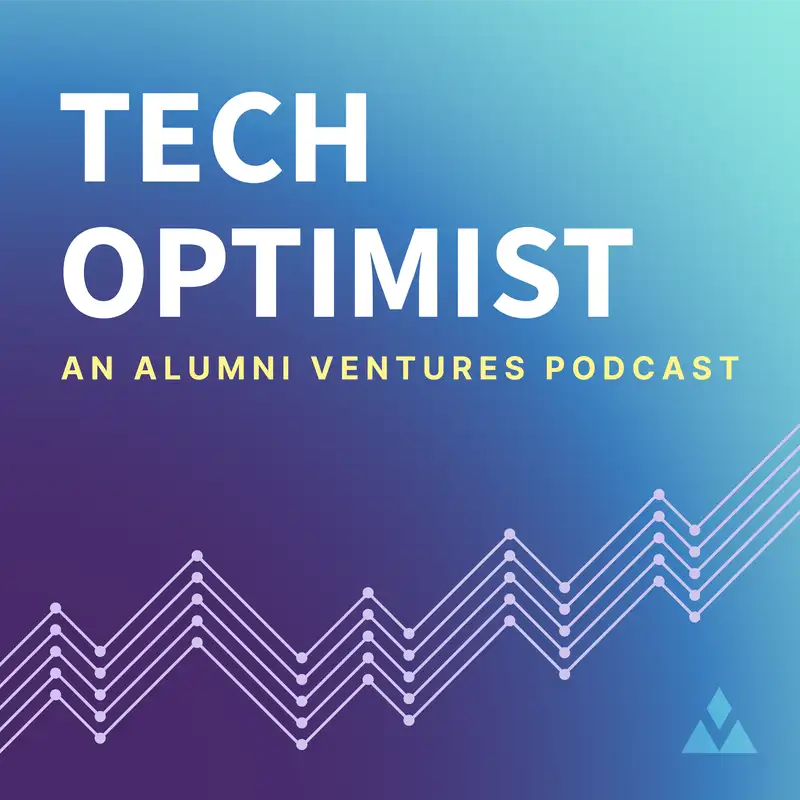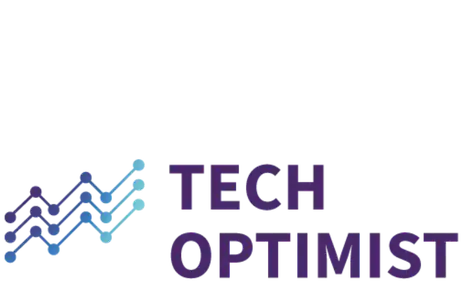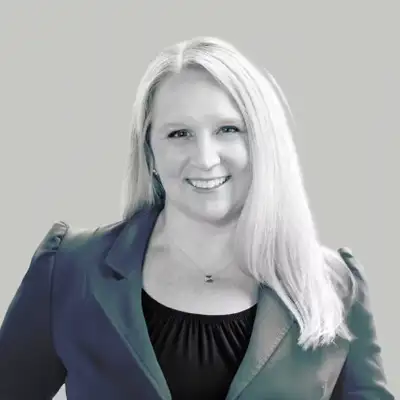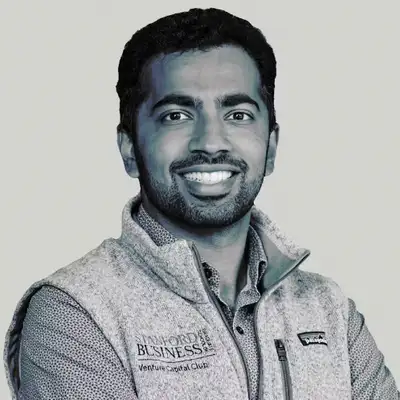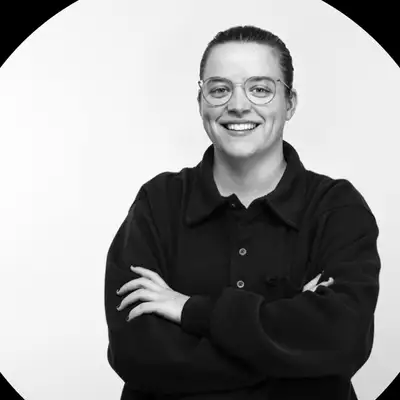#84 - Three Breakthroughs: AlphaFold 3
Samantha Herrick:
Attention listeners, please prepare for entry into the Tech Optimist Podcast by Alumni Ventures. This is your gateway to the cutting edge of innovation and visionary ideas shaping our future. Keep your mind open, your curiosity sharp, and your optimism fully engaged.
Our guide today, me, my name is Samantha Herrick, will take us through the thrilling twists and turns of groundbreaking technologies and inspiring founders. The future starts now.
Naren Ramaswamy:
Imagine just every scientist in the world now armed with this resource, what's possible in the field of healthcare and biology and drug development, drug discovery. It's staggering.
Samantha Herrick:
This is Naren Ramaswamy, senior principal at Alumni Ventures.
Mike Collins:
We're going to be really impacting almost all white-collar work in the '25-'26 timeframe, and probably by 2030 have something that far exceeds human capabilities.
Samantha Herrick:
And this is Founder and CEO Mike Collins.
And, hello. That's me, my name is Samantha Herrick, and I am the producer and host for this show.
Welcome back to the Tech Optimist, everyone. I am your guide, Sam Herrick, and I'm here to connect the dots and unpack the tech shaping our world.
Today's episode is packed with innovation, debate, and a glimpse into what the future holds for AI. So now we're joined by two incredible legends here behind the scenes at Alumni Ventures, Naren Ramaswamy and Mike Collins, and together they're going to explore some of those transformative breakthroughs in artificial intelligence today. Very AI-focused episode, which is pretty fascinating.
So, we're going to dive into the concept of AI scaling, and scaling in terms of how different models can be used for different things, right? I'll let Mike and Naren sort of take it from there, but that's just a general summary of what's going to go on today.
But then we're also diving into AlphaFold 3, Google DeepMind's latest milestone in protein modeling, and what its newly open-source capabilities mean for researchers in the industry. From AI-scaling challenges to game-changing advancements, we're going to uncover how innovations like these redefine science and technology.
And then the conversation turns to AI agents, the possibilities they unlock, the risks they carry, and the different visions for how they might shape the future.
Mike and Naren don't shy away from any controversial viewpoints here, so you can expect some very discussion about what comes next for humanity, and in the age of AI.
I'll be here adding some extra context along the way, but for now, I'm going to turn the mics over to Mike and Naren. And then, really quick we're going to hop into a disclaimer and an ad before we jump into the rest of the show. Hang tight, we'll be right back.
Speaker 4:
Do you have a venture capital portfolio of cutting-edge startups? Without one, you could be missing out on enormous value creation and a more diversified personal portfolio. Alumni Ventures, ranked a top-20 VC firm by CB Insights, is the leading VC firm for individual investors. Believe in investing in innovation? Visit AV.VC/foundation to get started.
Samantha Herrick:
As a reminder, the Tech Optimist podcast is for the informational purposes only. It is not personalized advice, and it is not an offer to buy or sell securities. For additional important details, please see the text description accompanying this episode.
Mike Collins:
Hi, welcome to Tech Optimist. This is where I and my teammates get together and talk about really cool things going on in venture capital, technology and innovation. My name is Mike Collins. I'm the founder and CEO of Alumni Ventures. I'm joined by Naren Ramaswamy today. Hi, Naren.
Naren Ramaswamy:
Hey, Mike. How are you?
Mike Collins:
I'm great. So, I'm going to kick it off today. There's been a lot of heated discussion around a topic called AI scaling. And again, my understanding of this is that there's two camps: one that basically says in order for AIs to become more powerful, we just need to throw more compute at it, and the more the better; and there is, I think in Sam Altman, and some others are in there, and it's basically, if we throw enough compute, you don't have to think through much else. The compute, the AI will figure out everything, and that is how we get better models, more information, more utility, and ultimately artificial general intelligence.
There is another camp that is equally as convinced that we're going to asymptotically approach diminishing returns here. Not that they're saying that it won't happen, but that the breakthroughs happen by improving other vectors of innovation. And, again, way above my pay grade to be what those would be, but those things, I think, have the implications for the rest of us, basically on predictability and timing.
So, if it's just more compute, that we know that we can measure, and we can anticipate with pretty strong accuracy that we're going to be in the era of AI agents sometime in 2025, and we're going to be really impacting almost all white-collar work in the '25-'26 timeframe, and probably by 2030 have something that far exceeds human capabilities, to the point where it starts to get scary in that 2029, 2030 range.
Then there's the other camp that says this is more like inventing, and you plateau out, and then you have a breakthrough, and you make a ton of progress, and then you plateau out again. And I think this just says it's a little less predictable, a little harder to say. I think generally, it says it's going to take a little longer, although with breakthroughs it can swing the other way as well.
But, again, I just know that this is something that is hot on the topic of people, and because AI has such profound implications for our society and for venture capital and for innovation, I wanted to share that this is going on, and wondered what you knew about it or had to say about it, Naren.
Naren Ramaswamy:
Thanks for bringing that up. I've been hearing about this chatter in Silicon Valley for the past couple months. And after talking to a few experts, it seems like the jury is still out on where we'll end up, which approach. But a lot of people are saying that there might be both approaches for different use cases. You'll have this AGI type of model that Sam Altman is raising $7 trillion for.
Mike Collins:
Yeah, right.
Naren Ramaswamy:
Which, by the way, is two times the GDP of the UK. Right? He's raising that from the Middle East?
Mike Collins:
Yeah, just two UKs. We'll start using that-
Naren Ramaswamy:
Just two UKs.
Mike Collins:
... as the unit of measure.
Naren Ramaswamy:
Right. Yeah.
Mike Collins:
And China's doing five UKs. Yeah.
Naren Ramaswamy:
And you had talked about just the productivity and timing implications, but I'm thinking about the macroeconomic implications of something like that, dollars moving at that scale. So, I think there's going to be one piece of that.
But for more specific enterprise use cases, maybe in legal tech, that you're looking at a set of documents that you need to be able to query, you actually do better with a smaller model that is more focused on that set of documents rather than the entire Internet, because the scope of errors and hallucination are much higher the larger the scope is. So, people think that there'll be a bit of both depending on the use case. I think I agree with that.
Mike Collins:
Yeah. I mean, I think it definitely, in kind of the short term, meaning years, I think it intuitively makes sense, and it's consistent with my own experience, which is there's a niche need. I'm trying to do something, and it's very particular to a certain customer, a certain workflow, a certain experience set, a certain way that humans want to interact. That requires a little more of a narrow, specific AI approach that is really targeted, kind of a rifle shot to a company, or a specific customer type, or a specific product.
And you don't need the "big God" model for that. You need strong models, but really focused, trained, and customized to what you're really trying to achieve. At the end of the day, you're still in an economy where you're trying to solve a problem through a product or service.
So, I tend to think in... Let's just try to be reasonable in the timeframe. In 2025, I think a lot of the value creation is going to be in these use cases. And, again, I had the fortune to study with Clayton Christensen, and just one of his frameworks for thinking about marketing in particular was to really focus on the customer problem and what job is the customer hiring you to do? And it has always been very powerful for me, as an innovator and a venture capitalist, to be always thinking about that first and foremost.
And then, if you apply an AI to help you deliver that to this group of people, I think it can be a huge amplifier. But there's a lot that goes into the data, the wrapping, the understanding, the human touch in there, where do you trust, where do you need human intervention?
So, I tend to intuitively believe in the short term that we're going to see much more of these customer approaches, language models that are a little more focused and tight and tuned to your particular business or use case, while the big heavyweight stuff is there.
And I even find that with the ChatGPT suite of models, there are times where I'm going to go just use 4.0, or 4.0 with... It has kind of the canvas feature if I'm doing some writing. But a lot of the analytics stuff, I used, actually, their mini reasoning model. Works super fast, gets it done. Their big boy model sometimes just seems like way too... For a marketing problem, it just seems like you're bringing kind a gun to a knife fight.
Naren Ramaswamy:
Over-engineering.
Mike Collins:
Overdone.
Naren Ramaswamy:
And who knows what the compute costs are for each of those responses on the backend for them, right? And people have said that OpenAI uses what's called a mixture of experts model, which is under 4.0. You might have different types of models to optimize cost for them, right?
Mike Collins:
Yeah.
Naren Ramaswamy:
And, as you remember, they used to have that 25 query limit, which they've now taken off if you're part of the paid license. So, it's different approaches to that same outcome.
But this is a good segue, Mike, to the topic that I wanted to bring up, which is more of a specialized model as it relates to biology called AlphaFold. And we've talked about AlphaFold because it's come out of Google DeepMind, and recently they announced AlphaFold 3, and the big breakthrough here is that they open-sourced the model, which has great positive implications. It was not actually open source. There was criticism against the initial restricted access. And then now DeepMind went ahead and open-sourced it, including the code and the model weights specifically for academic use, which is great, right? Anybody who's interested in researching how proteins are folding, but also how they interact with each other now. So that's the big breakthrough in this breakthrough, right?
Samantha Herrick:
Imagine a tool so transformative. It's reshaping the future of molecular biology and drug discovery. That is exactly what AlphaFold 3 for Google DeepMind brings to the table. Recently made open source for academic use, this advancement marks a new chapter in how researchers can explore the building blocks of life.
So, now we have talked about AlphaFold 3, and AlphaFold in general, a few times on this show. But if you need a bit of context and another summary on what it is, AlphaFold 3 isn't just another update, it's a leap forward. So, this iteration models proteins interacting with RNA, DNA and even drugs, pushing boundaries that were once considered unreachable. This capability opens doors for breakthroughs in areas like drug discovery, where understanding protein interaction is essential.
The decision to open source AlphaFold 3 follows significant criticism of the limited access researchers had to earlier versions. DeepMind responded by making the source code available to everyone for non-commercial use, and allowing academic researchers to request the powerful model weights. This step ensures scientists can dig deep into protein structures without barriers, provided they're working in a non-commercial setting.
The timing of this release couldn't be more notable, too. Just as Demis Hassabis and John Jumper received the 2024 Nobel Prize in Chemistry for AlphaFold's pioneering impact, the world now has broader access to the technology.
But DeepMind hasn't let go of its commercial reins entirely. The company continues to balance accessibility with innovation through its spinoff, Isomorphic Labs, while ensuring no unauthorized commercial use of the technology.
Now, AlphaFold 3 is more than just a tool. It's a shift in how science collaborates advances and pushes the frontier of what's possible. So, what does this mean for the future of medicine and molecular biology? Stick around as we explore how this game-changing tool could revolutionize research and innovation across the globe. Mike and Naren, take it away.
Naren Ramaswamy:
AlphaFold 2 was great at protein folding, and that's what led to Demis from DeepMind winning the Nobel Prize this year in chemistry. But what's fascinating to me is applying the technology that underpins large language models to something like protein folding. And just for our listeners, AI does very well at pattern matching, given a set of rules. That's what language is. But that's also how nature operates. You have the laws of physics, laws of biology, and DeepMind is done an amazing job teaching this model.
Mike Collins:
Yeah, biochemistry. Yeah.
Naren Ramaswamy:
Exactly. And so, imagine just every scientist in the world now armed with this resource. What's possible in the field of healthcare and biology and drug development, drug discovery? It's staggering.
Mike Collins:
Yeah. I mean, this is unlocking how humans work. At the fundamental level, proteins, amino acids, the folding of these things, the interactions of these things, has been largely trial and error. If you think about how we've discovered most of the therapeutic drugs to date, it's been happy accidents, from penicillin, to Ozempic, to blood pressure medication turns into Viagra. I mean, these things were just accidents, frankly.
And the ability of these models to turn them into engineering problems, that is the game changer. When instead of a lab and experiments, and, "Oh, we did some deep research and we have a little better understanding about this pathway, or this cycle, or these kinds of interactions, and we run some..." Just really slow.
But if you can create a simulated human, that really begins to understand the just enormous complexity of some of these subsystems. The ability then to test, simulate drugs, simulate solutions, is just orders of magnitude more effective and faster.
And, yes, at the end of the day, there is still a very laborious physical world we have to interact with, and appropriate levels of scrutiny and regulation and testing. But if you can do all of this work up front, it is way more efficient, way more effective. We can make many more drugs available. We can reduce the time to market. The number of drugs that'll look good in Phase 1, but then poop out in 2 and 3, if that can go down significantly, it just has huge implications.
So, yes, DeepMind, fantastic. AlphaFold 3, great. But, again, I just think it points to where this is heading. And, again, just huge optimism over the next decade or two in understanding the human condition and disease.
Naren Ramaswamy:
And Mike, just this knowledge previously would've been in the hands of some biology experts somewhere in the world in a lab, but now is available for the entire world to access at their fingertips. The same way that the Internet democratized information, this is democratizing expert-level information now. So, it's amazing.
Mike Collins:
I mean, drug discovery, we've seen this time and time again, too, is the way a lot of times academics have been incented is very siloed, and really a lot of great things happen when there is cross-pollination between labs and offices. And I actually think a lot of the work with AlphaFold and DeepMind has been very collaborative, actually. But I do think this also promises that the incentive structure to be more open source, and sharing of information and learning, hopefully will also accelerate so we are a little less siloed.
Naren Ramaswamy:
Yeah, absolutely.
Mike Collins:
And the power of people in a cluster, as well as compute.
Samantha Herrick:
Commercial break incoming. Sit tight, we'll be back.
Speaker 4:
Exceptional value creation comes from solving hard things. Alumni Ventures' Deep Tech Fund is a portfolio of 20 to 30 ventures run by exceptional teams who are tackling huge opportunities in AI, space, energy, transportation, cyber security, and more. These game-changing ventures have strong lead venture investors and practical approaches to creating shareholder value. If you are interested in investing in the future of deep tech, visit av.vc/deeptech to learn more.
Mike Collins:
And that, I think, will take us right back into, again, just state of play on AI, again, with a lot of stuff I think going to be released in the next three to six months related to agents. And so, again, for those that don't follow the industry quite as closely, I mean, agents are basically the computer, the software going and doing things on your behalf. Besides just writing copy or email or giving you text. The ability to go out and basically interact with any website, to do things that you would do on the website, is really how I think one should think about it.
Which is, if you could do it by going on to Expedia, or if you could go to a site where you have to do some work. In a B2B, you might have a salesperson interacting with Salesforce and doing 19 different workflows and tasks before or after a customer meeting. That's interacting with a website. Software, tools.
The ability of these systems to begin to do that on your behalf is in testing, and coming very, very quickly. And I think will unleash the same kind of enthusiasm, backlash, concern, the whole bundle of stuff that we had when ChatGPT 3 and 4 came out.
So, we've got Anthropic with Claude seems to be one of the companies, with their API. I think OpenAI's technology is rumored to be called Operator or Operations, or something along those lines. Again, we're seeing Google not sitting on the sidelines here-
Naren Ramaswamy:
With Jarvis.
Mike Collins:
... with Jarvis. You're seeing Apple really trying to play catch-up here with Siri, and clearly having some distribution leg-up here, in order to have Siri do things on your behalf.
And I think there's an arms race. So, the fact is, I think the fact that there's not one, there's four, also leads me to believe it's going to be sooner or later, because I think there's going to be... Like there was with OpenAI, there's a lot of buzz when you're the first one to make the big breakthrough.
And so, I think there's, I'm sure, heated debates on, is this ready for prime time? Is it going to work? Is there going to be backlash versus are we going to be late to the party?
Naren Ramaswamy:
I think this is similar to self-driving cars a little bit, in that the last 10-20% will take 80% of time. Because the pieces of the underlying technology are already here. The same way that we can read a website and perform a click, software can do that, too.
Meanwhile, AI is solving international mathematical Olympiad problems better than humans can. So, the technology is there, it's just about making it private and secure, and in a way that also, how do you trust someone to... It's like inviting someone you don't know to operate your computer and do things on your behalf. How do you develop that trust?
And it might just take time. And I'm curious to see how these different approaches differ, not on the technological standpoint, but on the use and trust standpoint. How do they engender trust amongst hundreds of millions of users? It'll be interesting to see.
Mike Collins:
Yeah, I think the analogy you gave, Naren, of self-driving cars is an excellent one, right? Because there, the stakes are really high: your life. So, I think it's a very slow trust that you're going to give to people.
I think the same will hold true with people and these agents, meaning it's one thing if I'm going to trust you to pull things together for me to finally decide, but I'm not giving you my credit card. At least I'm not going to give you my credit card out of the gate in the first period of time. But those things change over time, and humans do develop trust, and they go through this cycle of skepticism, baby steps, trust, can't live without it.
Naren Ramaswamy:
Yeah.
Mike Collins:
So, I think it'll be interesting, but I really am excited about getting on this vector of growth and improvement, and I'm excited to see how the different approaches work, how people take different strategies, and the marketplace will determine where we're going to trust it first.
Naren Ramaswamy:
Exactly. It's like having a team at your disposal out of thin air.
Mike Collins:
Out of thin air.
Naren Ramaswamy:
Instead of being an individual person just going about your life, irrespective of your relationship status. It's just, every person will have 10 different AI agents that'll do things for you.
Mike Collins:
And so, you become more of an orchestrator of your agents to do what you want to have done in a day. And that'll take some getting used to, and as you said, a lot of trust. But, great. It was good catching up with you, Naren. Wish you a happy Thanksgiving, and we'll talk again in a week or two.
Naren Ramaswamy:
Likewise. Thanks, Mike.
Samantha Herrick:
Thanks again for tuning into The Tech Optimist. If you enjoyed this episode, we'd really appreciate it if you'd give us a rating on whichever podcast app you're using, and remember to subscribe to keep up with each episode. The Tech Optimist welcomes any questions, comments, or segment suggestions, so please email us at info@techoptimist.vc with any of those, and be sure to visit our website at av.vc. As always, keep building.
